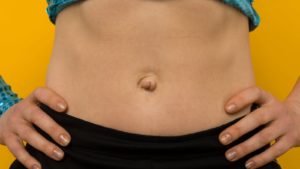If you are wondering why your stomach seems bigger after hernia surgery, you should know that this is normal. Generally, there’s nothing to worry about, and you can minimize it by carefully following the aftercare instructions provided by the surgeon.
In rare cases, swelling may be a sign that the umbilical hernia repair surgery was unsuccessful or it may be an indicator of infection. This blog post should provide you with an overview of why you may experience stomach bloating after hernia surgery.
Why Am I So Bloated After Hernia Surgery?
The body is remarkable in that it has a built-in repair process. When we experience an injury or some type of trauma, our body’s natural response is to send thousands of cells to the injured area to begin the healing process. White blood cells invade, and this is called “the inflammatory phase” because of the swelling that follows.
Another reason patients experience swelling after hernia surgery is a side effect of the surgical procedure. During hernia repair surgery, incisions are made through multiple layers of muscle and skin. The surgeon then manipulates the escaped abdominal contents back where it belongs before applying the reinforcing mesh. This often introduces air into the abdominal cavity and causes the stomach to look bigger after hernia surgery.
The abdominal cavity during the hernia repair is inflated with carbon dioxide to give the surgeon more access to perform the procedure, with most being removed before the incisions are closed, though some are always left trapped in the abdomen. Over the next 48 hours, your body naturally releases this gas. In the meantime, you may experience stomach bloating and shoulder pain as the gas travels upward.
The trauma of the hernia repair will create bruising which also triggers inflammation and swelling. Patients who undergo hernia repair surgery can expect a significant amount of swelling and bruising after their procedure.
How Long Does Swelling Last After Hernia Repair Surgery?
Many factors can affect the time it takes for the swelling to subside after a hernia repair surgery such as the type, size, and extent of the hernia repair, the patient’s daily habits, and poor diet.
Most patients experience some pain from the trapped gas, but it should dissipate after about 48 hours as the body releases the gas. A significant amount of stomach bloating occurring after the hernia repair should subside in a few days, but residual swelling can last several weeks.
Many patients experience a dull ache in their abdomen for a few days similar to after an abdominal workout or may have a sensation of pressure or fullness.
Patients can experience swelling in areas other than the hernia site such as the genitals or groin. Swelling that occurs in these areas is normal after a large inguinal hernia repair and can take a year or more to dissipate.
Complications and Abnormal Swelling After Hernia Repair Surgery
Patients should follow their aftercare instructions closely and monitor their hernia repair surgery for abnormal symptoms or any of the following issues:
- Firm lumps.
- Decreased sensitivity or numbness.
- Nausea, and vomiting.
- Burning sensation or pain.
- Lethargy or chronic fatigue.
- Sexual dysfunction.
The listed symptoms are not always a cause for concern but a quick exam can ensure they are not related to a serious issue. Swelling or bulges in the stomach that become bigger or more pronounced should be examined by your doctor.
Minimizing Swelling After Hernia Repair Surgery
While some swelling is expected and unavoidable. There are some things a patient can do to minimize the discomfort of a bloated stomach after hernia surgery.
1. A Healthy Diet Avoiding Gas-Inducing Foods
After hernia repair surgery, it is essential to take extra care of your diet to ensure a successful recovery. Consequently, we recommend avoiding sugary drinks, artificial sweeteners, fried foods, particularly spicy fare, and dairy products, as they all promote constipation, bloating, and gas. Alternatively, one should consume plenty of fresh fruits and vegetables such as berries, cucumbers, avocados, and bananas to nourish the body with vital vitamins and minerals while preventing uncomfortable side effects.
-
2. Regular Bowel Movements
- Constipation can cause straining. It is a common side effect of surgery and the use of local anesthesia. Also, some pain medications used after surgery to ease discomfort can slow down the bowels. The doctor will instruct you to take stool softeners for a while after a hernia repair surgery. I will help restore the function of the bowels and promote regular bowel movements. Stool softeners along with a healthy diet should help to release trapped gas and reduce stomach distention.
-
3. Remain Active
-
4. Get Enough Sleep
-
5. Follow Aftercare Instructions Diligently
-
6. Attend All Follow-Up Appointments
The first few days after hernia repair surgery the doctor will want you to take it easy, walk slowly, and not make any sudden or abrupt movements. After a few days, some light to moderate activity will help prevent complications and promote healing. Patients should not perform any activities that would cause strain or stress to their repair site.
Adequate sleep and rest allow your body to recharge, revitalize, and rejuvenate.
Patients receive customized aftercare instructions when they are discharged to return home to recover. Patients must follow all advised postoperative instructions to avoid future problems.
Don’t miss any post-operative appointments. Even though you are feeling great, the surgeon needs to ensure that you are healing properly.
-
7. Wear Your Abdominal Support Binder
Wear binder garments: promote healing, and reduce swelling/bloating. Wearing this binder can help prevent a recurrence due to strain before the repair site fully heals.
Your questions and concerns regarding hernia repair surgery can be addressed by the knowledgeable professionals at IBI Healthcare Institute‘s Advanced Hernia Center. Moreover, they are available to provide further information on how hernia repair surgery can be beneficial to you. So, you should make an appointment accordingly to explore this option further.











